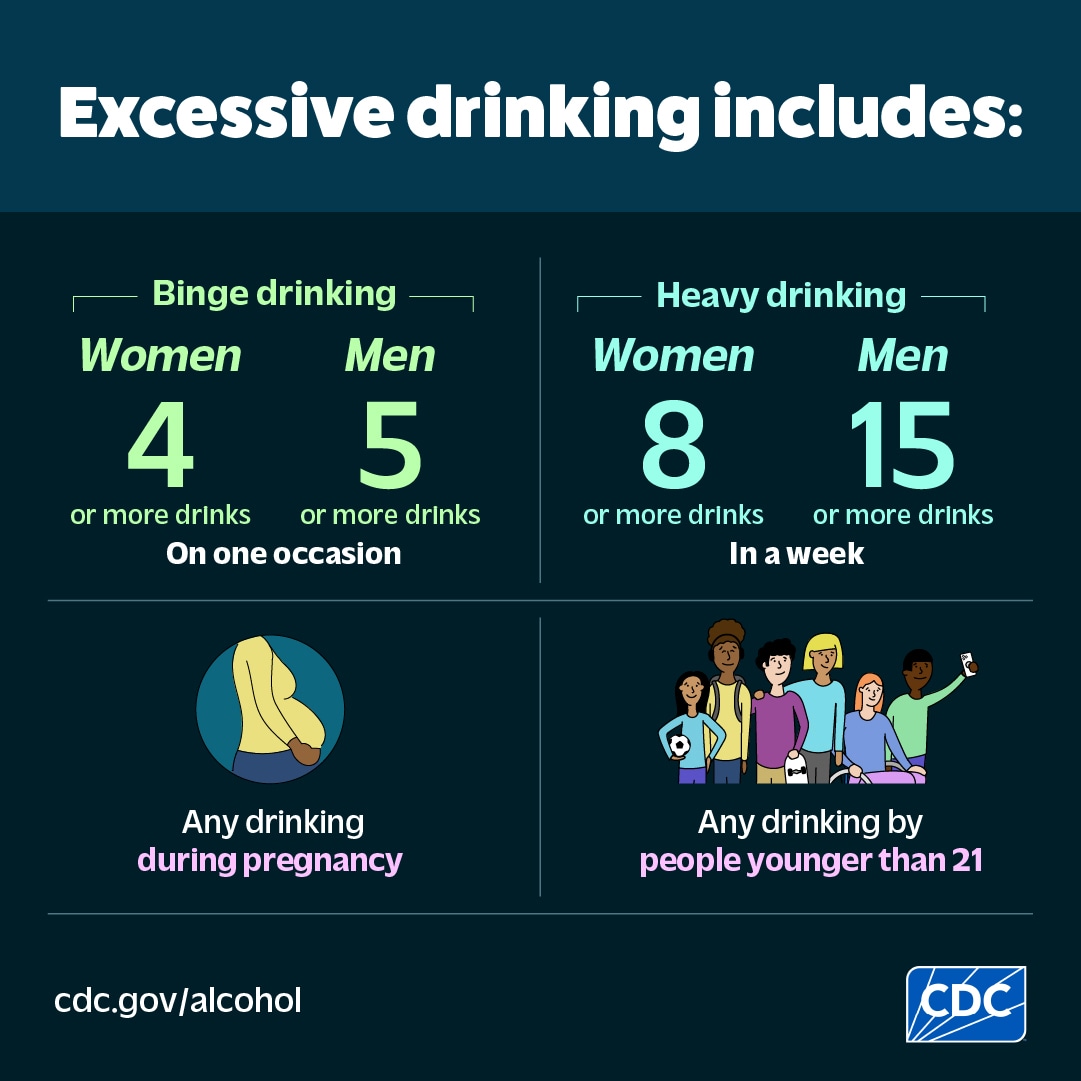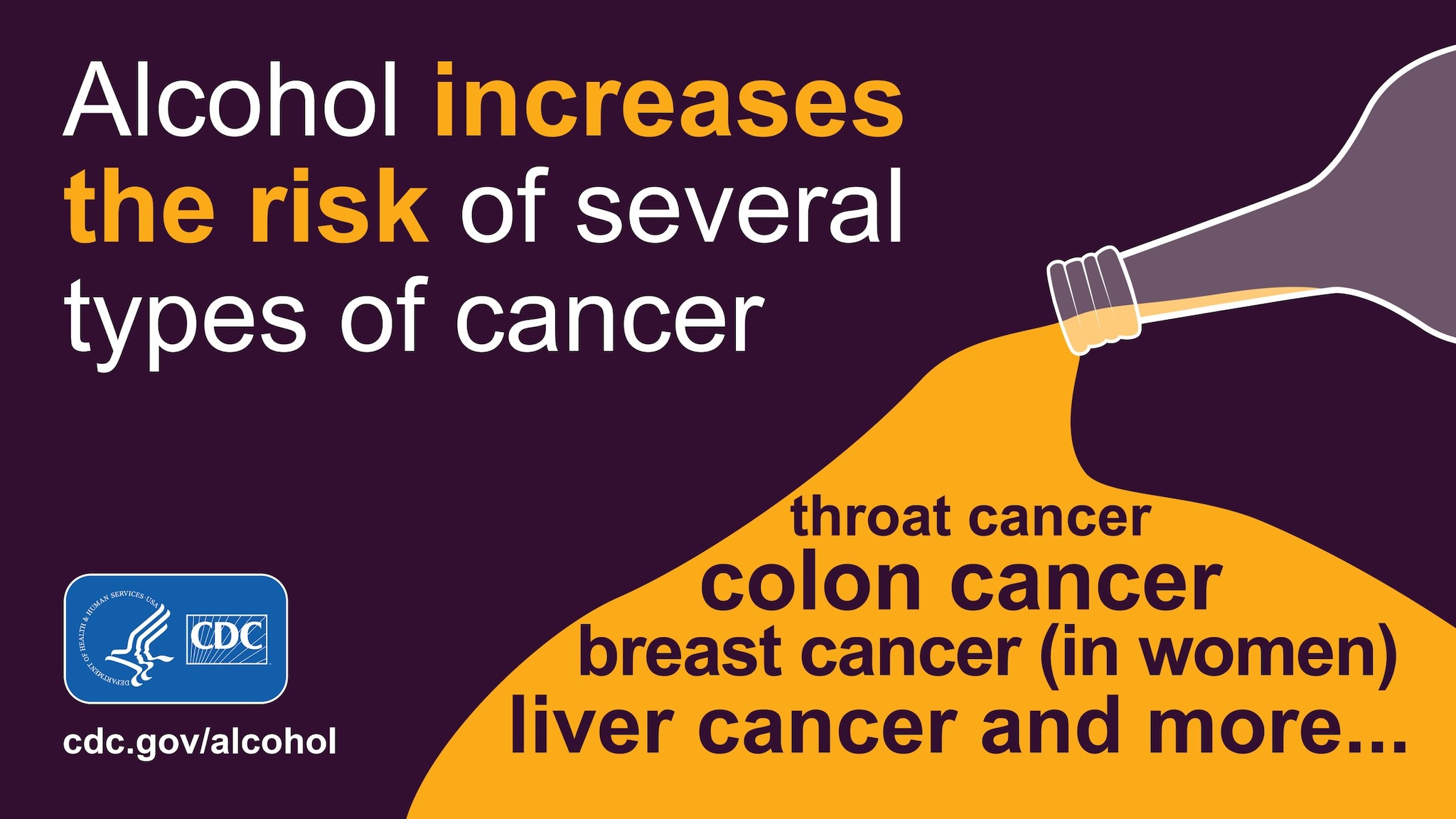Key points
- Excessive alcohol use can have immediate and long-term effects.
- Excessive drinking includes binge drinking, heavy drinking, and any drinking during pregnancy or by people younger than 21.
- Drinking less is better for your health than drinking more.
- You can lower your health risks by drinking less or choosing not to drink.

Why it's important
- Your liver can only process small amounts of alcohol.
- The rest of the alcohol can harm your liver and other organs as it moves through the body.
- The rest of the alcohol can harm your liver and other organs as it moves through the body.
- Using alcohol excessively on occasion or over time can have immediate and long-term health risks.
- By drinking less alcohol, you can improve your health and well-being.
Deaths from excessive alcohol use
Understanding alcohol use
Excessive alcohol use
Excessive alcohol use is a term used to describe four ways that people drink alcohol that can negatively impact health. Excessive drinking can also be deadly.

Excessive alcohol use includes:
- Binge drinking—Four or more drinks for women, or five or more drinks for men during an occasion.
- Heavy drinking—Eight or more drinks for women, or 15 or more drinks for men during a week.
- Underage drinking—any alcohol use by people younger than 21.
- Drinking while pregnant—any alcohol use during pregnancy.
Moderate alcohol use
Moderate drinking is having one drink or less in a day for women, or two drinks or less in a day for men.
Keep in mind
Effects of short-term alcohol use
Drinking excessively on an occasion can lead to these harmful health effects:
- Injuries—motor vehicle crashes, falls, drownings, and burns.
- Violence—homicide, suicide, sexual violence, and intimate partner violence.
- Alcohol poisoning—high blood alcohol levels that affect body functions like breathing and heart rate.
- Overdose—from alcohol use with other drugs, like opioids.
- Sexually transmitted infections or unplanned pregnancy—alcohol use can lead to sex without protection, which can cause these conditions.
- Miscarriage, stillbirth, or fetal alcohol spectrum disorder (FASD)—from alcohol use during pregnancy.
Effects of long-term alcohol use
Over time, drinking alcohol can have these effects:
Cancer

- Drinking any alcoholic beverages, including red and white wine, beer, and liquor, is linked with cancer.
- More than 20,000 people die from alcohol-related cancers each year in the United States.3
Other chronic diseases
Excessive alcohol use can lead to:
- High blood pressure.
- Heart disease.
- Liver disease.
- Stroke.
- Alcohol use disorder—this affects both physical and mental health.B
- Digestive problems.
- Weaker immune system—increasing your chances of getting sick.
Social and wellness issues
- Mental health conditions, including depression and anxiety.
- Learning problems, and issues at school or work.
- Memory problems, including dementia.
- Relationship problems with family and friends.
Prevention
You can take steps to lower your risk of alcohol-related harms.
The less alcohol you drink, the lower your risk for these health effects, including several types of cancer.
Check your drinking
- The risk of alcohol use leading to breast cancer in men has not been established.
- Most people who drink excessively do not have alcohol use disorder (also known as "alcohol dependence" or "alcoholism"). Many people who drink excessively can lower their alcohol use without specialized medical treatment. Facts about alcohol use disorder are available at: https://www.niaaa.nih.gov/publications/brochures-and-fact-sheets/understanding-alcohol-use-disorder.
- Esser MB, Sherk A, Liu Y, Naimi TS. Deaths from excessive alcohol use — United States, 2016-2021. MMWR Morb Mortal Wkly Rep. 2024;73:154–161. doi: http://dx.doi.org/10.15585/mmwr.mm7308a1
- Bagnardi V, Rota M, Botteri E, et al. Alcohol consumption and site-specific cancer risk: a comprehensive dose-response meta-analysis. Br J Cancer. 2015;112(3):580-593. doi:10.1038/bjc.2014.579
- Esser MB, Sherk A, Liu Y, Henley SJ, Naimi TS. Reducing alcohol use to prevent cancer deaths: estimated effects among U.S. adults. Am J Prev Med. 2024;66(4):725–729. doi: 10.1016/j.amepre.2023.12.003
